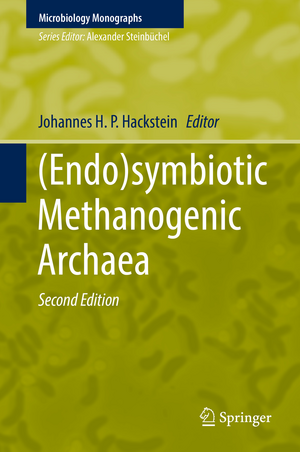(Endo)symbiotic Methanogenic Archaea: Microbiology Monographs, cartea 19
Editat de Johannes H. P. Hacksteinen Limba Engleză Hardback – 13 noi 2018
Methanogens are prokaryotic microorganisms that produce methane as an end-product of a complex biochemical pathway. They are strictly anaerobic archaea and occupy a wide variety of anoxic environments. Methanogens also thrive in the cytoplasm of anaerobic unicellular eukaryotes and in the gastrointestinal tracts of animals and humans. The symbiotic methanogens in the gastrointestinal tracts of ruminants and other “methanogenic” mammals contribute significantly to the global methane budget; especially therumen hosts an impressive diversity of methanogens.
This makes this updated volume an interesting read for scientists and students in Microbiology and Physiology.
Din seria Microbiology Monographs
- 18%
 Preț: 953.82 lei
Preț: 953.82 lei - 5%
 Preț: 1594.75 lei
Preț: 1594.75 lei - 18%
 Preț: 956.33 lei
Preț: 956.33 lei - 18%
 Preț: 951.29 lei
Preț: 951.29 lei - 18%
 Preț: 952.09 lei
Preț: 952.09 lei - 18%
 Preț: 1224.36 lei
Preț: 1224.36 lei - 18%
 Preț: 939.00 lei
Preț: 939.00 lei - 18%
 Preț: 1547.49 lei
Preț: 1547.49 lei - 18%
 Preț: 946.41 lei
Preț: 946.41 lei - 18%
 Preț: 1224.68 lei
Preț: 1224.68 lei - 18%
 Preț: 947.35 lei
Preț: 947.35 lei - 18%
 Preț: 1227.21 lei
Preț: 1227.21 lei - 18%
 Preț: 941.05 lei
Preț: 941.05 lei - 18%
 Preț: 946.55 lei
Preț: 946.55 lei - 18%
 Preț: 945.62 lei
Preț: 945.62 lei - 18%
 Preț: 1112.15 lei
Preț: 1112.15 lei - 18%
 Preț: 955.70 lei
Preț: 955.70 lei - 18%
 Preț: 944.19 lei
Preț: 944.19 lei - 18%
 Preț: 954.62 lei
Preț: 954.62 lei - 18%
 Preț: 950.66 lei
Preț: 950.66 lei - 15%
 Preț: 645.47 lei
Preț: 645.47 lei - 15%
 Preț: 643.34 lei
Preț: 643.34 lei - 18%
 Preț: 1225.94 lei
Preț: 1225.94 lei - 18%
 Preț: 947.04 lei
Preț: 947.04 lei - 18%
 Preț: 1113.58 lei
Preț: 1113.58 lei
Preț: 645.47 lei
Preț vechi: 759.37 lei
-15% Nou
Puncte Express: 968
Preț estimativ în valută:
123.53€ • 128.49$ • 101.98£
123.53€ • 128.49$ • 101.98£
Carte tipărită la comandă
Livrare economică 14-28 aprilie
Preluare comenzi: 021 569.72.76
Specificații
ISBN-13: 9783319988351
ISBN-10: 3319988352
Pagini: 230
Ilustrații: X, 261 p. 61 illus., 9 illus. in color.
Dimensiuni: 155 x 235 mm
Greutate: 0.56 kg
Ediția:2nd ed. 2018
Editura: Springer International Publishing
Colecția Springer
Seria Microbiology Monographs
Locul publicării:Cham, Switzerland
ISBN-10: 3319988352
Pagini: 230
Ilustrații: X, 261 p. 61 illus., 9 illus. in color.
Dimensiuni: 155 x 235 mm
Greutate: 0.56 kg
Ediția:2nd ed. 2018
Editura: Springer International Publishing
Colecția Springer
Seria Microbiology Monographs
Locul publicării:Cham, Switzerland
Cuprins
Free-Living Protozoa with Endosymbiotic Methanogens.- Anaerobic Ciliates and Their Methanogenic Endosymbionts.- Symbiotic Methanogens and Rumen Ciliates.- Methanogenic and Bacterial Endosymbionts of Free-Living Anaerobic Ciliates.- Termite Gut Flagellates and Their Methanogenic and Eubacterial Symbionts.- Methanogens in the Digestive Tract of Termites.- Methanogenic Archaea in Humans and Other Vertebrates: An Update.- Methanogens in the Gastrointestinal Tract of Animals.- Syntrophy in Methanogenic Degradation.- Hydrogenosomes.- Evolution of Prokaryote-Animal Endosymbiosis from a Genomics Perspective.
Textul de pe ultima copertă
This updated monograph deals with methanogenic endosymbionts of anaerobic protists, in particular ciliates and termite flagellates, and with methanogens in the gastrointestinal tracts of vertebrates and arthropods. Further chapters discuss the genomic consequences of living together in symbiotic associations, the role of methanogens in syntrophic degradation, and the function and evolution of hydrogenosomes, hydrogen-producing organelles of certain anaerobic protists.
Methanogens are prokaryotic microorganisms that produce methane as an end-product of a complex biochemical pathway. They are strictly anaerobic archaea and occupy a wide variety of anoxic environments. Methanogens also thrive in the cytoplasm of anaerobic unicellular eukaryotes and in the gastrointestinal tracts of animals and humans. The symbiotic methanogens in the gastrointestinal tracts of ruminants and other “methanogenic” mammals contribute significantly to the global methane budget; especially therumen hosts an impressive diversity of methanogens.
This makes this updated volume an interesting read for scientists and students in Microbiology and Physiology.
Methanogens are prokaryotic microorganisms that produce methane as an end-product of a complex biochemical pathway. They are strictly anaerobic archaea and occupy a wide variety of anoxic environments. Methanogens also thrive in the cytoplasm of anaerobic unicellular eukaryotes and in the gastrointestinal tracts of animals and humans. The symbiotic methanogens in the gastrointestinal tracts of ruminants and other “methanogenic” mammals contribute significantly to the global methane budget; especially therumen hosts an impressive diversity of methanogens.
This makes this updated volume an interesting read for scientists and students in Microbiology and Physiology.
Caracteristici
A valuable source of information for scientists of microbiology and biochemistry Offers a unique review of symbiotic methanogenic archaea and their hosts Second edition of a well-received book
